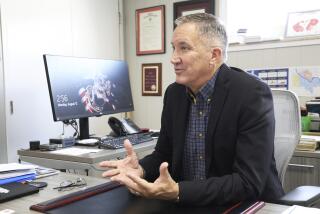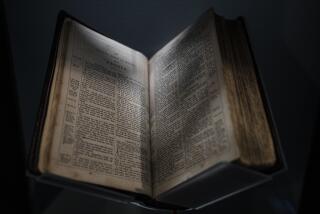Debate Over School Prayer
- Share via
* Re “A Duel Over Prayer in Schools,” April 13: Anyone who is so inclined may pray at home, in church/synagogue, or silently, anytime and anywhere (including the classroom). The attempt by Pat Robertson, et al. to force prayer into schools has nothing to do with free speech--it’s the first step in an attempt to make Christianity the state religion.
I’m amused by their reliance on “majority rules”--how quickly they’d change their tune if the majority were Jews, Muslims, etc.!
TAMA WINOGRAD
Studio City
* Let’s get honest in the school prayer debate. There always has been prayer in school. Any child can pray anytime he or she wants, as many times as he or she wants, silently.
The debate is about whether other children can be forced to hear someone else’s prayer. What the religious right wants is to have the government force my child to hear their particular prayer.
As long as there are algebra tests there will be prayer in school.
BILL SANDELL
Burbank
* “If the prayer offended one person in the class, then we shouldn’t have had it,” said Abhi Shellat, freshman at Harvard University. That typically is the minority thought concerning prayer in school these days throughout America. Could someone please ask Shellat and all those who agree with him what their answer would be to the following statement: If being unable to pray offended the majority of students in a class, and over 90% of the population, then shouldn’t they be able to pray?
SUE DORTIGNAC
La Habra
* When I graduated from high school, attendance was optional at the baccalaureate service at which a nondenominational prayer was given. This “prayer” was simply a brief moment of reflection and gratitude appropriate for the occasion. A reasonable person would not have considered it to be the “establishment of religion.”
It is difficult to understand why the same legal experts who say our government should not permit one 60-second prayer in 12 years of education, because it might offend even one student, have successfully argued that that same government should permit the public sale of pornography, be allowed to operate its own gambling institutions, and be restrained from measures to stop the increase of real physical violence to those same students who they fear would suffer apparently irreparable harm at having to sit through one little prayer.
It would be simpler if those students who find the graduation prayer to be offensive were simply more tolerant, like those who find, say, homosexuality offensive are expected to be. If the self-appointed state censors will pardon a biblical reference, it certainly seems that we are straining at gnats and swallowing camels.
PAUL E. LIGHTHILL
Palm Springs
More to Read
Sign up for Essential California
The most important California stories and recommendations in your inbox every morning.
You may occasionally receive promotional content from the Los Angeles Times.













